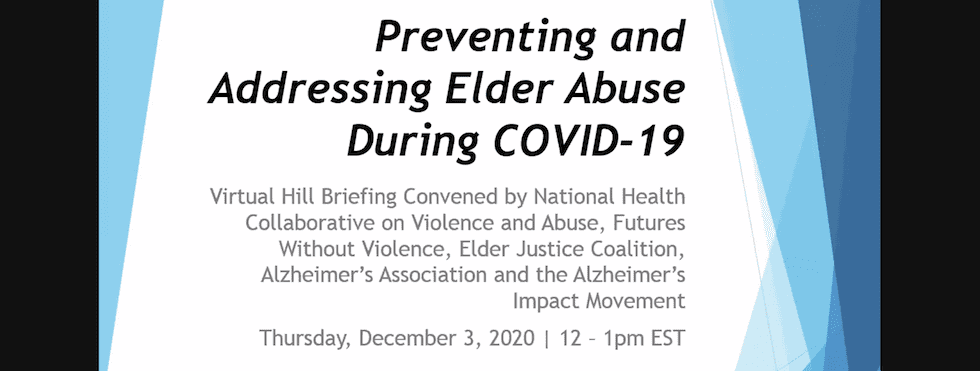

On Thursday, Dec. 3, 2020, Dr. XinQi Dong, director of the Institute for Health, Health Care Policy and Aging Research, joined fellow elder health and policy experts for a virtual congressional briefing about preventing and addressing elder abuse during COVID-19.
The briefing was presented by the National Health Collaborative on Violence and Abuse, Futures Without Violence, Elder Justice Coalition, Alzheimer’s Association and the Alzheimer’s Impact Movement, and honorary congressional hosts, U.S. Rep. Suzanne Bonamici (D-OR) and Rep. Peter King (R-NY), who are co-chairs of the bipartisan Elder Justice Caucus.
“Elder fraud and abuse, those aren’t new problems, but unfortunately the coronavirus pandemic and economic crisis have made it even more prevalent in communities across the country,” Bonamici said in a recorded statement played during the briefing. “Seniors are increasingly isolated and facing even more economic hardship, and abusers and summers are continuing to take advantage of them.”
The briefing was moderated by Tonya McFadden, director, Strategies for Health Equity at American College of Obstetricians and Gynecologists. In addition to Dong, speakers included Laura Thornhill, senior associate director, Regulatory Affairs at Alzheimer’s Association, and Robert B. Blancato, national coordinator, the Elder Justice Coalition.
Dr. Dong, a geriatrician and population health epidemiologist, has spent more than two decades studying issues related to elder abuse and in 2017, he edited the comprehensive book, Elder Abuse: Research, Policy and Practice.
Elder abuse can include physical, psychological and sexual abuse, financial exploitation, self-neglect or caregiver neglect, Dong said. And the impacts can be significant, including physical injuries and impairments, as well as declines in cognitive function, psychological distress and hopelessness, and even premature death.
“The impact is not just health related but also financial as well. Literature suggests that billions of dollars are lost not only to elder abuse but more specifically to financial abuse,” he said.
The COVID-19 pandemic has compounded many of the issues, for example, experts know social isolation exacerbates issues of elder abuse, neglect and exploitation, Dong said.
“When we think about issues of elder abuse, we can’t really separate talking about health disparity issues that are also very pervasive in the midst of COVID. We know that the prevalence rates for elder abuse differ substantially across different racial/ethnic groups,” he added.
Persons living with Alzheimer’s disease and dementia as well as their families and caregivers, also are particularly vulnerable to abuse and neglect, Thornhill said. Because of cognitive impairment, “persons affected by the disease may not be able to protect themselves from abuse or even recognize it,” she said.
Dementia may affect people in different ways, Thornhill said, and the Alzheimer’s Association is working to provide training for justice personnel, including law enforcement, social workers and others to support people with the disease and help prevent and address elder abuse.
Blancato emphasized the need to reauthorize the Elder Justice Act, which was signed into law as part of the Affordable Care Act to address abuse, neglect and exploitation of the elderly. It provides dedicated funding for adult protective services, forensic centers that enable better detection and reporting elder abuse, training and many other resources.
“The law technically expired in 2014 — it continues to get funded, but that’s not good enough. A law of this importance should not continue to be in legislative limbo. It needs to be renewed and made stronger,” Blancato said.
According to the U.S. Department of Justice, 10% of people over age 65 will be victims of elder abuse, and according to the FBI, older adults lost $3 billion in 2019 to financial fraud and abuse, Blancato pointed out.
Awareness of the issues and impacts is critical, Dong said, emphasizing how everyone can help raise awareness and support legislation and funding.
“With awareness comes care, and with care comes actions,” he said.
Watch the entire briefing: